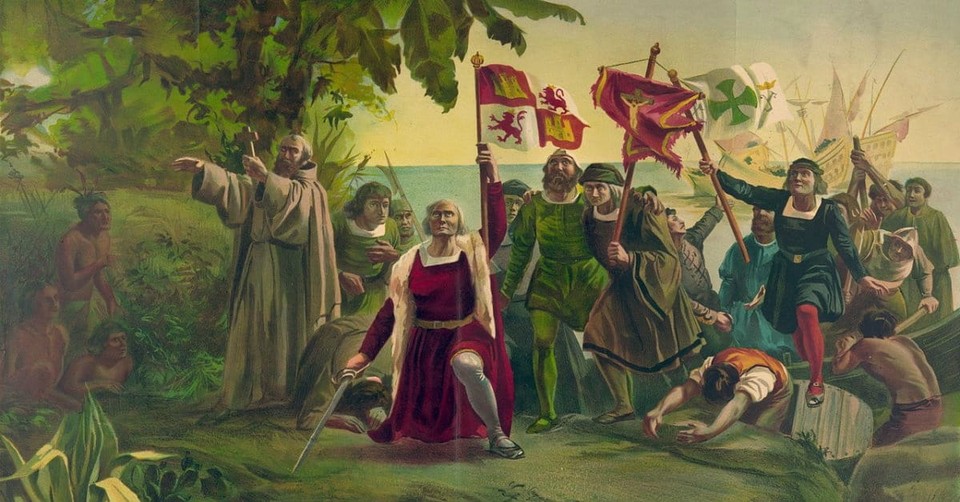5 Facts You Might Not Know about Christopher Columbus

“In 1492 Columbus sailed the ocean blue!”
To be honest, that’s probably the extent of knowledge about Christopher Columbus that many of us have. If pressed for more information, we can say that Columbus discovered America (sort of) and was seeking gold and a new water passage to India. Since Americans celebrate Columbus Day once every year, shouldn’t we know a bit more about this towering historical figure?
1. Christopher Columbus introduced slave trade to the Americas.
Though the buying and selling of slaves was common in other parts of the world, to our knowledge it was not practiced in the Americas until Columbus brought it to the Caribbean. Writing of slaves just as he might other goods, Columbus penned in his diary,
"We can send from here, in the name of the Holy Trinity, all the slaves and Brazil wood which could be sold."
He wrote many other entries referring to the native peoples as simple, naïve, and easy to take advantage of. Because Spanish law forbade slavery for Spanish citizens and Christians, Columbus decided to enslave rather than baptize the natives. Even practices like sex slavery, mutilation, and frequent use of the gallows were practiced at these settlements, which leads to #2…
2. Christopher Columbus was arrested, stripped of his titles, replaced as Governor, and failed every task he set out to accomplish.
We already know that Columbus never sought to discover a new continent – so that was a surprise bonus. But that also meant he had failed to reach India and a new passage for ships, and he never found great riches in the Americas as he’d hoped. But you already know this from elementary school. Remember those issues with native slavery and mistreatment that we mentioned in the first section? According to Biography.com,
“[C]onditions at the Hispaniola settlement had deteriorated to the point of near-mutiny with settlers claiming they had been misled by Columbus' claims of riches and complaining about the poor management of his brothers. The Spanish Crown sent a royal official who arrested Columbus and stripped him of his authority. He returned to Spain in chains to face the royal court. The charges were later dropped but Columbus lost his titles as governor of the Indies and for a time, much of the riches made during his voyages.”
Although he eventually was released from jail and even returned again to the new world, he fell out of favor with both Spain and the colonists. After Queen Isabella died in 1504, Columbus’ most loyal supporter was no longer able to vouch for him, and he was never able to regain his titles or former prestige.
3. The “Columbian Exchange” brought new culture (and new disease) to both continents.
Columbus set in motion a huge intercontinental exchange of foods, goods, culture, and deadly diseases, through his voyages to and from the Caribbean.
“The horse from Europe allowed Native American tribes in the Great Plains of North America to shift from a nomadic to a hunting lifestyle. Foods from the Americas such as potatoes, tomatoes and corn became staples of Europeans and helped increase their populations. Wheat from Europe and the Old World fast became a main food source for people in the Americas. Coffee from Africa and sugar cane from Asia became major cash crops for Latin American countries.”
Unfortunately, the diseases that came part and parcel with this great exchange had devastating effects in the Americas.
“Small pox from the Old World decimated millions of the Native American population to mere fractions of their original numbers. This more than any other factor made for European domination of the Americas. The overwhelming benefits of the Exchange went to the Europeans initially and eventually to the rest of the world. The Americas were forever altered and the once vibrant and rich cultures of the Native American civilizations were not only changed, but lost, denying the world any complete understanding of their existence.”
4. Christopher Columbus was a product of his time.
It may be difficult for modern Christians to understand many of the actions and motivations of a man like Columbus, who claimed to be a Christian and hailed from an incredibly religious culture of origin. But Columbus lived in a very different world. Europeans of Columbus’ day were not troubled over many matters that concern our world today, such as the preservation of ancient culture and the freedom to practice any religion one pleases. Spain was looking to colonize, to expand its empire, and Columbus was ready to help it do so in order to explore the world.
Additionally, though many criticize Columbus’ thirst for gold, it behooves the historian to remember that Columbus’ voyages were neither cheap, nor was he traveling on his own dime. The regimes who sponsored his many voyages were promised a return on their investment, so Columbus’ search for gold in the Americas (which so often returned fruitless, or at the cost of human life) was an unfortunate consequence of the high cost of exploration. Columbus did not have the luxury to sail endlessly, or be satisfied with the delights of flora and fauna; he had debts to repay.
5. We celebrate Columbus Day because…
Did you know that Columbus Day only became an official American Holiday in 1937?
Although the legacy and discoveries of Columbus had been celebrated unofficially since the 1790’s, the official holiday only happened because of The Knights of Columbus. The Knights of Columbus, an influential male-only Catholic organization, wanted a strong Catholic role model for their children to be dignified by the government. After intense lobbying by the Knights, President Franklin Roosevelt and Congress declared Columbus Day a legal and federal holiday in the U.S.
Debbie Holloway is the Family Life Editor for Crosswalk.com.
Originally published October 09, 2023.







